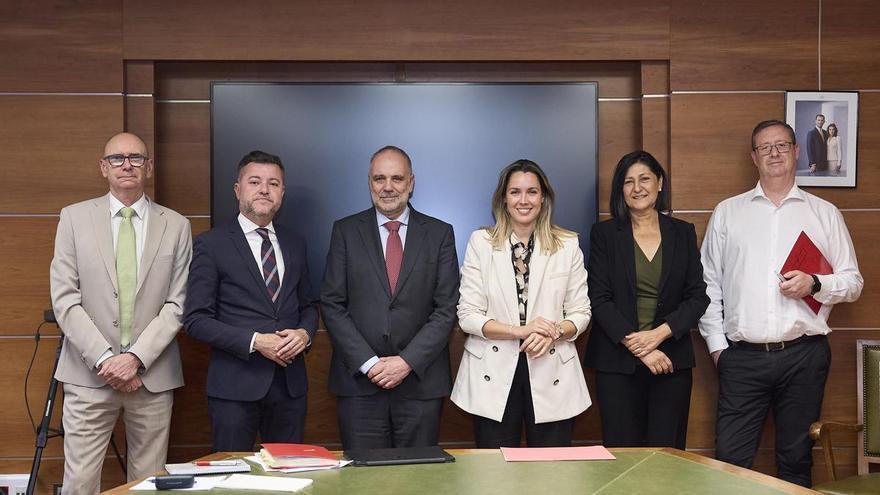
The Canary Islands government and the councils of Gran Canaria and Tenerife are already negotiating with the central government for a “stable financing” formula for the respective railway projects in the two capital islands, considering a possible option being a bilateral agreement similar to the one in force for the Archipelago’s roads. All parties agree, in any case, on the need to establish some sort of “legal tool” to have the projects recognized as “of general interest” and have access to state resources in a scheduled manner over time, independent from political circumstances for inclusion in successive general state budgets.
This was the main conclusion reached by the representatives of the four administrations involved in the negotiation after the first technical meeting created for this purpose, following an initial political meeting on March 6 by the Transport Minister of the Canary Islands Government, Pablo Rodríguez; Transport Minister, Óscar Puente; and the presidents of the councils of Gran Canaria and Tenerife, Antonio Morales and Rosa Dávila, respectively. In today’s meeting, the parties were represented by Maria Fernández as the Director General of Transport for the regional government; the Sustainable Mobility Councillor of the Gran Canaria Council, Teodoro Sosa; the Mobility Councillor of the Tenerife island corporation, Eulalia García (Tenerife); and the Director General of the Railway Sector at the Ministry, Carlos Juárez.
Fernández highlighted the fact that, for the first time in history, a “technical committee” is being established to study the “legal and financial framework” for the two railway projects of the two most populated islands, requiring an investment of 4,000 million Euros (1,500 for Gran Canaria and 2,200 for Tenerife), aiming to link the airport areas of both islands with their respective capitals. “Until now, we have managed with annual specific allocations in the state budgets for the development of studies, but that is not enough for projects of this magnitude, and we need a stable financial plan,” summarized Fernández after the meeting, highlighting that “all the proposals we have put forward will be studied, they will tender a socioeconomic impact study on both islands to support the future legal tool, be it through an agreement, a program contract, or another form”.
Previous Approach
[–>
This prior agreement for the search for a legal solution implies, in fact, a substantial difference from what the Canarian Government and the councils proposed in the aforementioned meeting with the minister on March 6. On that occasion, the island administrations were in favour of including the two projects in the national railway network as the best method to participate in state financing, meaning they would be general interest infrastructures assumed by the State in financial terms, while the councils retained their management autonomy. However, this approach has been ruled out because, as Fernández explained, “it would be equivalent to starting over two projects that are already very mature in their technical aspects, and furthermore, the specific requirements for integration into that national network of Adif (Railway Infrastructure Administrator) would be impossible to meet”. “We have abandoned that path and have highlighted our own, and because of our condition as an ultra-peripheral region, we can have a railway network of general interest due to its economic and social impact, and its significance in sustainable mobility”.
Nevertheless, the main objective remains to achieve secure, stable, and planned funding through agreements or program contracts between Canary Islands and the State four or five years ahead. “With the agreement in hand, we will avoid everything being a year-to-year struggle in the state budgets,” emphasized the Director General of Transport for the regional government, meaning to safeguard the State’s financial participation from political and economic circumstances and, therefore, independent of the political colour in the central Government, or the parliamentary majorities upon which each of the state budgets may depend. Additionally, to ensure that “stable funding”, the Canarian side aims to establish some form of legal anchor in any of the state laws related to sustainable mobility.
“We have emphasised that this future agreement is not a one-off, but is anchored at a legislative level in the Sustainable Mobility Law or any other through a transitional provision to have our differential status recognised, something that Europe would already.
Short Deadlines for Implementation of Infrastructure Projects
The local authorities in Gran Canaria and Tenerife are pushing for their respective railway projects to be recognised as of general interest by the State in order to secure stable funding. This recognition would enable them to access potential European funds for the development of their infrastructure. Representatives have welcomed the commitment by the Ministry of Transport to commission a socioeconomic impact report before finalising the project recognition and financing methods, demonstrating progress towards future funding opportunities. It is anticipated that a legal solution will be in place before the 2025 budget discussions.
Subscribe to continue reading
















